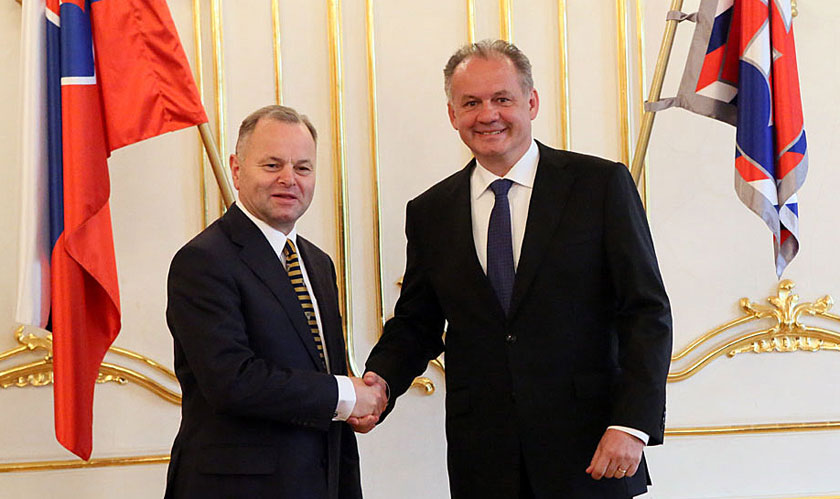
President of the Storting Olemic Thommessen meeting Slovakia’s head of state, President Andrej Kiska. Photo: Storting.
– An important partner
Slovakia’s forthcoming EU presidency, the security situation in Europe, and EEA grants topped the agenda during the political meetings in Slovakia on 1st and 2nd June.
See photos of the visit on Flickr. All photos may be freely used provided they are correctly credited.
The President of Slovakia, Andrej Kiska, opened the meeting with President of the Storting Olemic Thommessen by talking about the security situation in Europe. President Kiska made special reference to relations with Russia and expressed great interest in Norway’s view on the deployment of NATO forces in the Baltic and, potentially, Norway.
The meeting with President Kiska on 2nd June brought to an end the official visit to the Czech Republic and Slovakia, which Ingjerd Schou (Conservative Party), from the delegation to the Parliamentary Assembly of the Council of Europe, Marianne Aasen (Labour Party) from the Delegation to the EFTA and EEA Parliamentary Committees, and Jan Arild Ellingsen (Progress Party), from the NATO PA delegation, also took part in.
President Kiska thanked the delegation for the Norwegian EEA grants and also talked about the EU presidency, which Slovakia will assume on 1st July this year.
Room for more collaboration
In common with the other political meetings that the delegation had taken part in in the Czech Republic and Slovakia, the refugee crisis was an item under discussion during the meeting with President Kiska. Jan Arild Ellingsen MP had the following to say about the visit:
“The primary focus during our visits to the Czech Republic and Slovakia has undoubtedly been the challenges that the ongoing refugee crisis have given us all. That being said, it’s pleasing that both nations are clearly conscious about their responsibilities as NATO member states, and will work to increase their respective defence budgets,” he said.
“Norway ought to view better military collaboration as an opportunity. It will open up for cutting costs while also raising capacity and inter-operability. Small NATO members must be better at pooling their resources,” he added.
Keen for Norway to join
While in Slovakia the Norwegian delegation also met Andrej Danko, Speaker of the National Council, and Peter Pellegrini, the Deputy Prime Minister.
Pellegrini stressed Slovakia’s intention to work for Europe’s digital single market and the energy union. The nation is also well aware of its obligation to handle the migration crisis. Moreover, a possible British EU exit as a result of the referendum on 23rd June could make the Presidency unusually challenging.
As a member of the EEA, it is essential that Norway has a close relationship with the EU Presidency. Pellegrini underlined that Slovakia wished to retain close ties with Norway and confirmed that the tradition of inviting Norwegian parliamentarians to EU parliamentarian assemblies would be continued.
Grateful for grants
During its visit, the delegation from the Storting was shown several of the projects that have received Norwegian EEA funding.
“It was very helpful to see specific examples of how important the EEA grants are for civil society in the Czech Republic and Slovakia. Norway funds extremely valuable and worthwhile projects; crisis centres, a Holocaust centre, and education and initiatives for Roma children so that they are better equipped to start school, just to mention a few,” said Marianne Aasen.
“In return for these grants, we are given full access to the single market, so it’s reassuring to see how beneficial they are and how little bureaucracy is involved. What’s more, everybody’s plainly so hugely grateful for the funding,” she added.
The treaty on a new period of EEA grants was signed on 3rd May this year. It will be dealt with in the Storting on 8th June.
Also of interest
Last updated: 03.06.2016 15:49